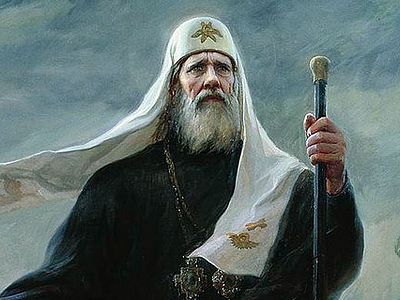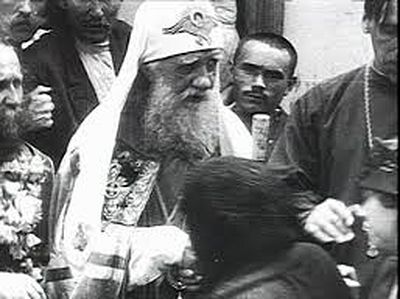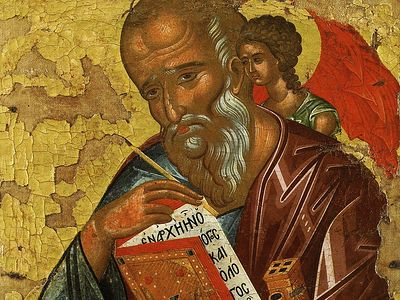In the name of the Father and the Son and the Holy Spirit!
Though I speak with the tongues of men and of angels, and have not love, I am become as sounding brass, or a tinkling cymbal. And though I have the gift of prophecy, and understand all mysteries, and all knowledge; and though I have all faith, so that I could remove mountains, and have not love, I am nothing… And now abideth faith, hope, love, these three; but the greatest of these is love (1 Cor. 13:1-2, 13).
Dear friends, today is the day of the repose of the holy apostle and evangelist John the Theologian and today is also the day of the glorification of St. Tikhon, the patriarch of Moscow and all Russia.
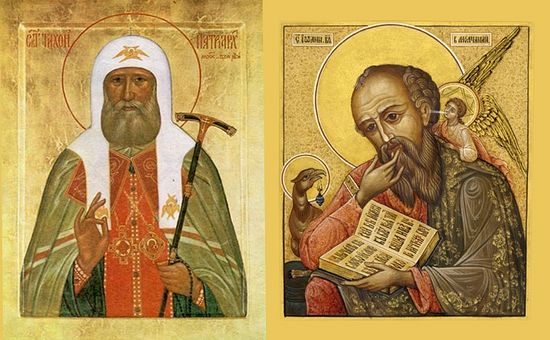
The holy Church celebrates the memory of the apostle and evangelist John the Theologian three times in the year, and his memory never fails to warm our hearts.
For a long time, a very long time, he alone was the ruler of our attention and love on this day, September 26 [Sept. 26/Oct. 9—O.C.]. But now three years ago the providence of God masterfully provided together with the apostle of love yet another of His chosen ones—the first hierarch, patriarch of Moscow and all Russia Tikhon. The primate’s glorification, taking place precisely on this day, and the memory of him, having been revivified by the finding of his incorrupt relics, flows into the mighty stream of ecclesial memory, preserving by the will of God the story of every person who lived by God, lived by the Church, and especially placing on the candle stand of the Church feasts namely those who with all the fullness of their lives fulfilled the will and teachings of God.
Thus, two candles burn now in the Church by the imperishable Thaboric light, illuminating for us by their lives the path to Heaven.
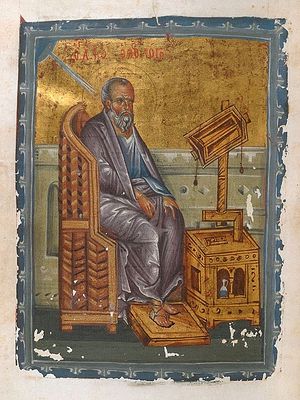
The holy apostle and evangelist John the Theologian is the first link in an unbreakable chain of blessed succession from the Lord Jesus Christ Himself in the first century of Christianity, and the last link is the hieromartyr Tikhon, twenty centuries removed from the days of Christ the Savior’s dwelling on earth.
And does not there arise in us the question of why the Lord united these two elect of His here on earth, if not because it was by one heart and by one mind that they lived, although in different times and circumstances—the same work they fulfilled, living on earth so as to unite themselves in eternity and on earth in the memory of the people? Let us look closer at their lives and draw from the fountain of ever-present living water which grants immortality to the soul.
The apostle John by his pure virgin soul so loved the Lord that no earthly attachments burdened him in life. He gave to God his heart, full of the aromas of pure and holy love for Him alone. While yet quite young he left his father’s, the fisherman Zebedee’s, house and answered to the preaching of the Forerunner of Christ, calling the people of God to prepare the way of the Lord:
Make His paths straight (Mt. 3:3). Young John himself embarked on this path in anticipation of the One coming after the Baptist, Who shall baptize you with the Holy Spirit, and with fire (Mt. 3:11).
And here St. John the Forerunner points out One to his disciple and says to them: behold the lamb of God Who takes away the sins of the world… (Jn. 1:29). And, obedient to the word of the virgin-teacher, the virgin-disciple leaves John the Forerunner to follow the Greatest Virgin and Teacher and our Savior.
John followed Christ, having left everything for His sake: his home, his father, his mother, and the quiet, peaceful life of a fisherman, and went out on the turbulent temporal sea of the hitherto unknown path to the unknown promised land—to the Kingdom of Heaven. So did John’s heart ignite in the first century in the presence of Christ.
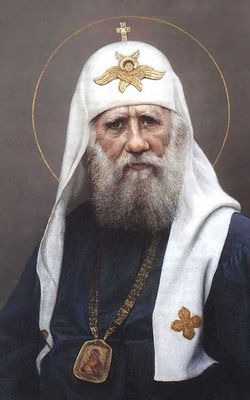
But did not the heart of young Vasily Belavin, in a land far from Israel, cold Russia, twenty centuries having past since the time of the podvigs of the Savior and the labors of John the Theologian, burn just the same? Thirteen-year-old Vasily left his father’s house for the sake of his studies in seminary, for already in his parent’s home the youth’s heart was wounded by love for Christ, for His commandments, and for His Church. And the playfully respectful nickname "Bishop," given to him by the seminarians, prophetically beheld the life path of this righteous one from the very beginning.
And as John gave to God his well-preserved treasure—the chastity of his heart, so did Vasily bring to God the same gift. And with love, as a holy gift Christ accepted the devotion of these young hearts. From the fullness of His love the Lord poured out into their hearts the inexhaustible fountain of living and active love. And they, having attained to the perfection of love, were able to enlighten and warm by it those both near and far. The love of St. John the Theologian has come down through the centuries, and the love of St. Tikhon has shone forth to us from the tomb.
In his time John loved Christ with all his soul, wholly and persistently cleaving to Him until the end of His earthly sojourn. It was a three year “academy" in which taught the Divine Teacher Himself, where the living word of the New Testament was visibly made manifest.
St. John the Theologian—one of the three—was a witness to Christ’s raising of the daughter of Jairus. John was one of the three great disciples who beheld the glory of the transfigured Christ. St. John reclined on the bosom of the Savior at the Last Supper on Mt. Zion, where was consumed the Passover lamb of the Old Testament, laying down as a law forever by Christ—the Lamb of God—the New Covenant with mankind in His Blood.
That was the time when the cornerstone—Christ—was laid at the foundation of the Holy Orthodox Church, аnd His disciples became the first teachers and apostles of His Church.
The heart of the disciple, so full of love, merges together with the heart of the Divine Teacher, that there are no secrets hidden from the student. The whole life of the Divine Teacher, all His works, all the unfathomable depth of the new teaching is opened to any heart. And the young John within three years came to the measure of the statue of Christ, maturing to the fullness of selflessness in order to live only in God, ripened for service to God and man, and ripened for the apostolic way of the Cross, having become all things for all men.
The future Patriarch Tikhon, then yet the young Vasily, passed four years in the academy, maturing at the feet of the Savior, in the bosom of the Holy Orthodox Church, and he foresaw the Lord, at [his] right hand (Ps. 15:8). And his new reverential nickname "Patriarch" which he received from his academy friends, proving to be prophetic, speaks to us about his way of life at that time.
And Vasily embraced by his purity and uninhibited soul the love of Christ, and warmed by its beams he, like the apostle John, matured to a full surrendering of himself to the will of God, and matured to preparedness for going there where the Lord would call him, to drink to the dregs of the cup prepared him by the Lord. He made his first step behind the Lord on the Cross, bowing the nape of his neck in his twenty-sixth year to the three great monastic vows: poverty, chastity, and obedience, and monk Tikhon was born, for whom began a new life, from the first until the last day given in service to God and to the Russian Orthodox Church.
Within six years he was already a bishop. The episcopacy was for him “not strength, honor and power, but work, labor, and a podvig.”
At thirty-one years of age he became the father of fathers, and his God-loving heart was marked by love and sensitivity for the people, unerringly captivating the hearts of his flock in God’s love. Such is the quality of love, as according to the word of the apostle and evangelist John the Theologian: God is love (1 Jn. 4:8).
I’ll give one, at first glance, insignificant example from the life of the hierarch Tikhon, just a year after having entered in upon his high episcopal service. St. Tikhon spent in all a year at his first cathedra, but when he received an ukaz of his transfer the city was filled with lamentation—the Orthodox wept, and the Uniates and Catholics, of whom there were many also in Chelm, also wept. The city gathered at the station to see off their archpastor, who had served them for such a short time, but was so beloved by them. The people tried to withhold their departing Vladyka by force, removing the train attendants, and many even lying on the tracks, making it impossible to carry away from them their pearl of great price—their Orthodox bishop. Only the heartfelt appeal of Vladyka himself calmed the people.
Such sendoffs accompanied St. Tikhon throughout his whole life. Orthodox America wept, where till this day he is known as the Apostle of Orthodoxy; ancient Yaroslavl wept; Lithuania wept, parting with their archpastor who became for them as their own father.
Both of these God-pleasers—the holy apostle and evangelist John the Theologian and the first hierarch Tikhon—through many sicknesses and trials labored “in the Gospel of Christ.” The love of these disciples for their Divine Teacher proved to be stronger than fear before their enemies. They so loved the Lord that they walked the path of the Cross, ascended upon the Cross and crucified themselves and their lives. They lived not for themselves, but for Him Who died and resurrected for them.
At the Cross of the Savior, co-suffering with Him was John. The Savior entrusted His Mother to his boundlessly loving heart alone, adopting him to her. To His beloved disciple the Lord entrusted His Mother for care and custody until the end of her days.
At the cross appearing before the Russian Orthodox Church—the Bride of Christ on earth—St. Tikhon placed himself, accepting the podvig of the patriarchal service in Russia’s terrible troubled years. To His beloved disciple the Lord entrusted His beloved bride for care and preservation.
And the times were such that everything and everyone was overwhelmed with panic about the future, when malice came alive and flourished and working people stared deadly famine in the face, and fear of looting and violence penetrated into the homes and churches. A general feeling of impending chaos and the kingdom of antichrist seized Rus’.
And under the thunder of guns, under the clacking of machine guns Patriarch Tikhon was placed upon the patriarchal throne by the hand of God, to ascend to his own Golgotha and become the holy patriarch-martyr.
How tearfully the new patriarch wept before the Lord for his people and for the Church of God: “…O Lord, the sons of Russia have forsaken Your covenant, destroyed Your altars, shot the sacred items in churches and kremlins, beaten Your priests…” And he pronounced the answer of the Lord sounding in his mournful heart in that difficult time, ascending the Cross: “Go and seek those, for the sake of whom the Russian land still stands and is upheld. But don’t abandon the lost sheep, doomed to perdition, to the slaughter … the lost—find, those turned away—restore, the afflicted—bandage… feed them on truth.” The Lord beheld a good shepherd.
We have not enough time to enumerate all the works and podvigs of these presently commemorated holy men. They both carried the preaching of the Gospel of Christ in the harshest, most fearful conditions, one surrounded by the evil of the pagan world, the other by the terrible demonic wickedness of the new atheists, fallen from truth.
The persecutions of Nero against the new religion subjected the apostle to many tortures: he drank poison and he was burned in a cauldron of boiling oil, but remained unharmed. The persecutions of the new atheists of the twentieth century subjected His Holiness Patriarch Tikhon to incomparable suffering. He was burned in the spiritual fire of hourly sufferings and tormented by the questions: how far is it possible to concede to the godless authorities? Where is the boundary when he would be obligated to place the good of the Church higher than the welfare of his people, higher than human life, not his own, but the lives of his faithful Orthodox children? He already wholly ceased thinking about his own life and his own future. He was himself prepared to die daily.
I repeat the words of the patriarch which we have all heard many times: “Let my name perish in history, only that the Church might be benefited.” Such was the measure of his podvig; such was the measure of his true service. He walks in the wake of his Divine Teacher until the end.
The life of the apostle John is running short. The final prophetic book about the future judgment of the Church and the world is already written by the exile, beholding an awesome vision on the desert rocks of Patmos. The enfeebled centenarian elder, the laborer for Christ gives his last sermon: “Children, love one another! It is the commandment of the Lord, and if you keep it, it is enough.” This is all the teaching which the fading candle of Christ’s beloved preaches from the fullness of his love.
We are drawing near to the end of the podvig of the patriarch-martyr. Shed, shed upon Russia is the blood of the martyrs. His life is exhausted, and his testament sounds forth: “My children! All Orthodox Russian people! All Christians! Only upon this rock—of healing evil with good—is built the indestructible glory and greatness of our Holy Orthodox Church… and indefinable even for enemies will be its holy name and the purity of the podvig of its children and ministers.” “Follow Christ! Do not betray Him! Do not succumb to temptation. Do not kill your soul in the blood of vengeance. Do not be overcome by evil, but overcome evil by good!” The love of Christ and gentleness towards enemies: the patriarch’s final sermon.
Obedient to their teacher’s order, John’s disciples buried him alive in the dust of the earth. The patriarch’s closest companions buried their patriarch-martyr, departed into the joy of eternity.
A few days pass and John’s disciples, having opened his tomb, do not find his body. His tomb was empty—the triumph of love and chastity: the breath of death did not quench his burning love.
But sixty-seven years passed and the tomb of the patriarch-martyr was also empty. The Lord granted his holy relics to Russia for strengthening in the present difficult times. And as once in the hour of trial our Lord and Savior called forth St. Tikhon, so now He has sent him to help the earthbound Church Militant.
My friends! I hope I have managed to answer for you the question of why the Lord deemed to celebrate the memory of His two elected children on the same day. And who, having penetrated into the lives of two of God’s people, living in the first and twentieth centuries, dares now to say that the law of God is given not for all and not for all times, if they—these two examples—testify to us today, that all things are always possible for a believing and loving heart, for the Lord yesterday, today, and forever is the same? There is room for everyone at His feet, from the first century of His coming on earth until the last. And equal rewards await those who worked for Him in the first hour, and in the last.
Let us kneel down my beloved, children of God, to the Lord; let us kneel down with love and prayer, with faith and hope, and not disgrace the Lord of our love, and strengthen our faith, and justify our hope.
And don’t forget, my dears, that now abideth faith, hope, love, these three; but the greatest of these is love. Amen.

